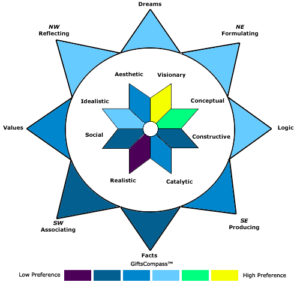“If people can be educated to see the lowly side of their own natures, it may be hoped that they will also learn to understand and to love their fellow men better.” – C.G. Jung
In the last article, we reviewed the primitive attributes of extraverted sensation as a shadow type. In this article, we will consider it as a shadow projection, and also in its destructive oppositional role to extreme one-sidedness.
Extraverted Sensation as Projection
People with extraverted sensation as the “inferior” or “shadow” type may feel uncomfortable about the practical aspects of living in the world. They may forever be forgetting something, missing key details, or overlooking the obvious. They can easily feel intimidated by people who favor this type, for those are the people who often seem so much better adjusted to practical realities.
For the person with inferior extraverted sensation, shadow “projections” will tend to privately diminish those who are so well adapted. Thoughts like “They are so superficial,” or “Really? Have they no deeper interests?” may be rummaging around in the personal unconscious, projecting their negative implications onto others.
 Yet, that person could benefit by acknowledging and accepting his own “inferior” side.
Yet, that person could benefit by acknowledging and accepting his own “inferior” side.
“If people can be educated to see the lowly side of their own natures, it may be hoped that they will also learn to understand and to love their fellow men better. A little less hypocrisy and a little more tolerance towards oneself can only have good results … for we are all too prone to transfer to our fellows the injustice and violence we inflict upon our own natures.” (CW 7, par. 439)
Projections from the “lowly side”–the shadow side–will apply a degrading patina, framing someone as too energetic, too sensually oriented, or superficially tied to material things. But projections can also have a “halo” effect, framing the same person as engaging, athletic, and well grounded if the anima/animus is being projected.
Extraverted Sensation as Opposition to Extreme One-sidedness
Very often the lead type in consciousness will be introverted intuition–the diametric opposite of extraverted sensation. With the Gifts Compass Inventory (GCI) we have also seen introverted thinking or introverted feeling in the lead position.
When any of these lead types become overly identified with the object of their orientations–the images of the collective unconscious, ideas, or ideals–then extraverted sensation in the shadow will seek to undermine the conscious disposition with neurotic ties to the world.
“But if, through a forced exaggeration of the conscious attitude, there should be a complete subordination to inner perceptions, the unconscious goes over to the opposition, giving rise to compulsive sensations whose excessive dependence on the object directly contradicts the conscious attitude. The form of neurosis is a compulsion neurosis with hypochondriacal symptoms, hypersensitivity of the sense organs, and compulsive ties to particular persons or objects.” (CW 6, par. 663)
The lofty identifications of introverted attitudes are held to earth with the ballast of an archaic extraverted sensation.
“Instinctuality and intemperance are the hallmarks of this sensation, combined with an extraordinary dependence on sense-impressions. This compensates the rarefied air of the conscious attitude, giving it certain weight, so that complete ‘sublimation’ is prevented.” (CW 6, par. 663)
A theoretical physicist who loses himself daily in the hypotheses of an orderly and infinite cosmos may be compulsively disturbed by the aging face he sees in the mirror each morning; a pastor who delivers high-minded sermons about a righteous God may find himself drawn into a lurid sexual liaison. The inferior extraverted sensation acts out in ways completely unanticipated by the conscious attitudes, undermining an excessively one-sided orientation to life.
